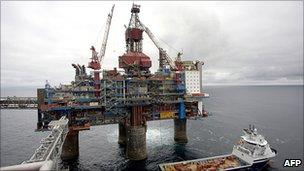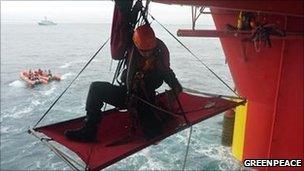EU to tighten rules for offshore drilling
- Published

Firms seeking offshore drilling permits in Europe may have to meet EU-wide standards
The European Commission has proposed tightening the rules for deep-water drilling in the oil industry.
The move follows April's devastating BP oil spill in the Gulf of Mexico.
Europe has more than 900 offshore wells, although only Norway currently allows drilling as deep as 1,300m (4,265ft), comparable to BP's ill-fated Deepwater Horizon facility.
The Commission wants to ensure that firms drilling in European waters can cover the costs of a spill, external.
The BP disaster not only allowed more than 4m barrels of oil to pollute the sea - it also frightened oil regulators worldwide. If it could happen once, they thought, it could happen again.
The EU Energy Commissioner, Gunther Oettinger, wants any company drilling within European waters to prove it has either the cash in the bank to pay for a clean-up, or appropriate insurance to cover the cost.
No general moratorium
He also intends to change rules that currently make companies liable for costs if they are drilling up to 12 nautical miles from shore. He wants this distance extended to 200 nautical miles.

Greenpeace activists boarded a Greenland rig in protest at drilling
The Commission wants international experts to inspect oil platforms, which are controlled by national authorities in Europe.
Draft legislation on the new rules will be presented in early 2011.
Previously Mr Oettinger had called for an EU-wide suspension of deep-water drilling. But that call was rebuffed by the UK government and the European Parliament. Now the Commission says EU member states can opt to impose a voluntary national moratorium.
Scottish Lib Dem MEP George Lyon said: "The proposed voluntary moratorium will allow European safety standards to be revised and renewed without harming the operations of North Sea rigs that already have outstanding safety records."
Nearly 900 offshore installations are operating in the EU, of which 486 are in UK waters, the Commission says.
Several countries want to practise deep-water drilling like Norway, the Commission says.
West of the UK's Shetland Islands, wells of up to 1,600m are planned, and near the Faroe Islands they are considering a depth of 1,100m.
Deep-water wells are operating off Libya's Mediterranean coast and Egypt plans to drill deeper than 2,000m offshore.
Greenpeace protest
Greenpeace is opposed to deep-water drilling and has been involved in high-profile protests in recent weeks.
The environmental group ended its blockade of a drilling ship 100 miles (162km) off Shetland late last month after oil company Chevron won a second court order.
Protesters had brought the drill ship Stena Carron to a standstill by swimming in front of it.
Earlier they spent five days in a pod which they had attached to the ship's anchor chain, before Chevron took legal action to remove it.
And four Greenpeace activists were arrested in September after giving up their occupation of a Scottish company's drilling rig off Greenland.
The group had boarded the rig, which was operated on behalf of Edinburgh-based Cairn Energy.
- Published12 October 2010
- Published29 September 2010
- Published2 September 2010
- Published21 September 2010
- Published14 July 2010